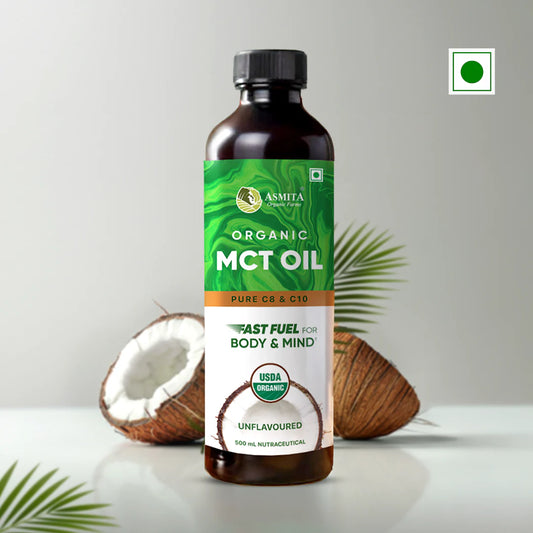MCT oil is a supplement that’s quickly gaining popularity in the health and wellness world—but what is MCT oil, exactly, and why is everyone talking about it? Whether you're following a ketogenic diet, looking to naturally boost your energy, or simply curious about this trending fat source, understanding what MCT oil is can help you make more informed choices on your wellness journey.
Favoured by fitness enthusiasts and clean-eating communities alike, MCT oil is best known for delivering fast, efficient energy. In this blog, we’ll break down everything you need to know about this powerful oil—and how it might support your lifestyle.
Table of Contents
- MCT Full Form
- Source of MCT Oil
- Types of MCT Oil
- MCT Oil Uses
- Side Effects of MCT Oil
- Bottom Line
- FAQs about MCT Oil
MCT Full Form
MCT stands for medium chain triglycerides, a specific type of fat that your body processes differently than other fats. The MCT oil meaning becomes clearer when you understand that these are saturated fats with a unique molecular structure that allows them to be rapidly absorbed and metabolised by your body.
Unlike long-chain fatty acids found in most dietary fats, medium chain triglycerides contain 6-12 carbon atoms in their structure. This shorter chain length is precisely what does MCT stand for in terms of its functionality; it allows these fats to bypass the usual fat digestion process and go straight to your liver, where they're quickly converted into energy.
Source of MCT Oil
MCT oil is primarily derived from coconut oil, and occasionally from palm kernel oil. However, coconut oil remains the most popular—and sustainable—source. At AsmitA Organic Farms, our MCT oil is made exclusively from 100% organic coconuts, with no palm oil, no fillers—just pure, clean fuel.
Coconut oil naturally contains around 50–60% medium chain triglycerides. Through a process called fractionation, these MCTs are isolated and concentrated to create a clear, odourless, and flavourless oil that delivers fast, efficient energy.
When comparing coconut oil vs MCT oil, it’s important to know that while coconut oil contains MCTs, it also includes longer-chain fats. MCT oil, on the other hand, consists almost entirely of medium chain triglycerides, making it more potent and targeted for energy, metabolism, and cognitive support.
While MCTs can also be found in small amounts in foods like dairy and certain nuts, concentrated MCT oil offers a far more efficient way to reap their benefits.
Types of MCT Oil
Understanding the different types of MCT oil is crucial for choosing the right product for your needs. Medium chain triglycerides come in several forms, each with unique properties and benefits:
MCT C8 (Caprylic Acid) is known for having the most powerful ketogenic effect. It quickly converts into ketones, making it ideal for those on a ketogenic diet or anyone seeking fast mental clarity and clean energy. Because of its rapid absorption, C8 is a favourite among athletes, biohackers, and high-performance lifestyles.
MCT C10 (Capric Acid) also converts into ketones, though slightly slower than C8. It provides more sustained energy and supports endurance, making it a great everyday option for balanced energy release.
MCT C12 (Lauric Acid) behaves more like a long-chain fat and doesn’t convert into ketones as efficiently. However, it offers antimicrobial properties and immune support, making it useful for general health.
At AsmitA Organic Farms, our MCT oil is a powerful blend of C8 and C10, carefully formulated to deliver rapid, clean energy and sustained performance—without any unnecessary fillers or less effective MCTs.
MCT Oil Uses
MCT oil is incredibly versatile and easy to add to your daily routine. One of the most popular ways to use it is in morning coffee, where it creates a creamy, energising drink that supports focus and sustained energy.
You can also blend it into smoothies for a quick nutrient boost, drizzle it over salads as a light, flavourless dressing, or add it to protein shakes for enhanced workout fuel. Some even use it as a pre-workout supplement or incorporate it into low-carb recipes for extra fat support on a ketogenic diet.
Because MCT oil is quickly absorbed and converted into energy, it’s ideal for anyone looking to support mental clarity, metabolism, and performance—without the crash.
Side Effects of MCT Oil
MCT oil is generally safe for most people, but it's important to start slowly—especially if you're new to it. Taking too much too soon can lead to digestive discomfort such as nausea, stomach cramps, or diarrhoea.
To avoid these effects, it’s recommended to start with 1 teaspoon to 1 tablespoon per day and gradually increase as your body adjusts. Do not exceed 3 tablespoons (45 mL) per day unless advised by a medical professional.
Because medium chain triglycerides are rapidly absorbed, your digestive system may need time to adapt. Introducing MCT oil slowly into meals or beverages can help your body adjust more comfortably.
Bottom Line
Understanding what is MCT oil opens up possibilities for enhancing your health and wellness journey. At AsmitA Organic Farms, we believe that clean, purposeful nutrition starts with integrity. That’s why our Organic MCT Oil is made only from 100% organic coconuts—no palm oil, no weird additives, just the good stuff.
Ready to swap sluggish mornings for sharper thinking and steady energy? Try our MCT oil and fuel your day the natural way. Shop now and feel the difference!
FAQs about MCT Oil
1. Can I take MCT oil every day?
Yes, most people can safely consume MCT oil on a daily basis. Start with 1 teaspoon per Yes, MCT oil is safe for daily use. Start with 1 teaspoon to 1 tablespoon and increase gradually to help your body adjust and avoid digestive discomfort. Avoid exceeding 3 tablespoons (45 mL) per day unless advised by a healthcare professional.
2. What is MCT oil used for?
MCT oil is commonly used to boost energy, support weight management, enhance cognitive function, and as a supplement in ketogenic or low-carb diets.
3. What is MCT oil made from?
MCT oil is made from coconut oil oil through a process called fractionation, which isolates and concentrates the medium chain triglycerides from these natural sources.
4. Can you take MCT oil while fasting?
This depends on your fasting goals. Technically, MCT oil contains calories and will break a Technically, MCT oil contains calories and will break a strict fast. However, many people use it during intermittent fasting or fat-fueled fasts to support energy, curb hunger, and stay in ketosis—especially on keto or low-carb diets. If your goal is autophagy or a strict zero-calorie fast, it’s best to avoid it.

Organic MCT Oil
Rs. 2,518.00
Rs. 3,598.00






